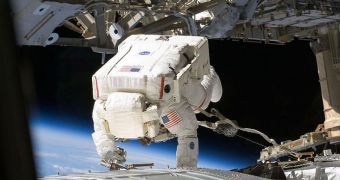According to a new set of investigations, it would appear that astronauts and future space travelers are at increased risks of suffering bone health issues related to their stay in microgravity than their peers who remain “trapped” on Earth.
The investigation raises serious problems for manned space exploration plans, researchers say, considering that a potential mission to Mars, for example, would take one and a half years to conduct.
At this point, the technology to visit the Red Planet is set in place, but we still need to understand how such a long duration trip to our neighboring planet would influence astronauts' bodies and minds.
In order to test the latter, an experiment called Mars500 is currently underway in Russia, where six people are locked inside a bogus spacecraft simulating a trip to planet for 520 days.
In the new study, it was revealed that there are indeed reasons to be concerned, as far as bone health goes. Astronauts returning from stays on the International Space Station (ISS) are living proof of this.
Researchers have determined that these brave people need more than a year after returning from the orbital lab to regain their full bone functions.
As such, the scientists who conducted the new work say that space agencies need to develop methods of ensuring that bone density is not lost in space, rather than relying on the fact that astronauts will be able to regain their health by exercising when they return home.
“If we can intervene in space and have crew members not lose as much, that would be the best outcome for them,” explains study researcher Shreyasee Amin.
The expert, who was the leader of the research team, holds an appointment as an associate professor at the Mayo Clinic, in Minnesota, Space reports.
In the recent investigation, the scientist and her crew studied more than 28 American astronauts, aged 36 to 53, who spent anywhere between 95 and 215 days aboard the ISS.
An interesting finding in the research was that women appeared to be losing a lot less bone density than male astronauts. The reason why this happened could not be determined, but the team plans to conduct new studies to find that out.
“There are [still] a few things we need to dice out before we make any definitive decision that we should only send women to space,” Amin jokes.
The researchers did not take into account the health of astronauts that are currently exercising their bodies on new fitness equipment delivered to the ISS. It could be that NASA struck the jackpot with them, but at this point scientists don't have enough data to say whether that's the case or not.

 14 DAY TRIAL //
14 DAY TRIAL //